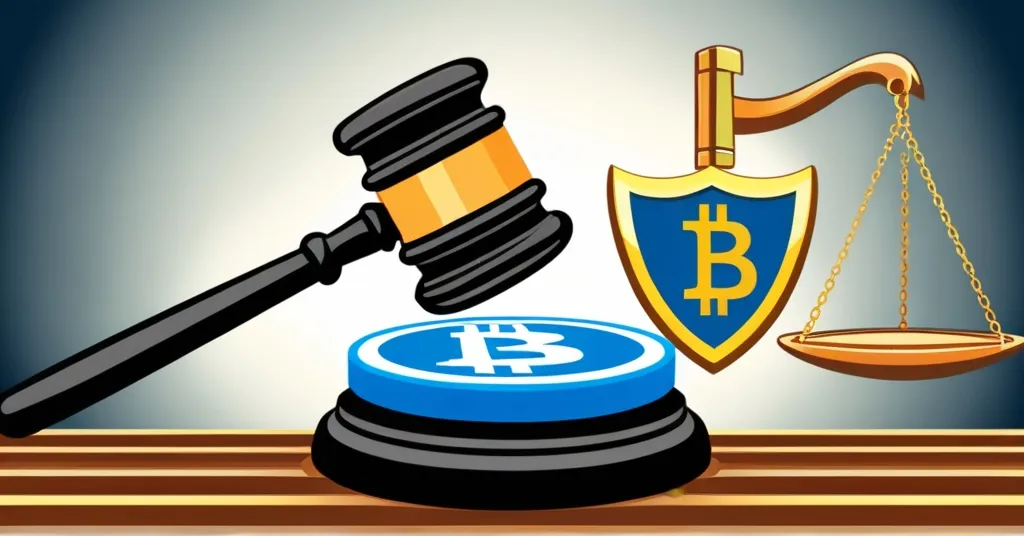Coinbase Triumphs in Court: SEC Forced to Reconsider Crypto Rules

Coinbase’s Partial Win Against SEC: A Landmark Ruling
Coinbase has secured a significant victory against the U.S. Securities and Exchange Commission (SEC) at the Third Circuit Court of Appeals, a decision that could reshape crypto regulations and challenge Gary Gensler’s leadership.
- Coinbase wins writ of mandamus against SEC
- Court criticizes SEC’s denial as “vague” and “unreasoned”
- SEC forced to reconsider crypto regulations
Background on Coinbase vs. SEC
The crypto industry has long been at odds with the SEC, particularly under the leadership of Gary Gensler. This tension stems from the SEC’s perceived regulatory overreach and lack of clarity regarding digital assets. Coinbase, a leading cryptocurrency exchange, sought clearer crypto regulations from the SEC, but their request was initially denied. This denial led to Coinbase’s legal battle, culminating in a petition for a writ of mandamus, which is a court order compelling a government official to perform a specific act. The Third Circuit Court of Appeals sided with Coinbase, marking a pivotal moment in the ongoing struggle for regulatory clarity.
The Court’s Decision
The court found the SEC’s denial of Coinbase’s request to be “vague” and “unreasoned,” compelling the SEC to reconsider its stance on crypto regulations. This ruling is a scathing critique of the SEC’s approach to digital asset regulation, highlighting the need for clearer guidelines. The court’s decision underscores the growing tension between crypto firms and regulatory bodies, emphasizing that the SEC cannot simply dismiss requests for regulatory clarity without a thorough explanation.
Industry Reaction
Paul Grewal, Coinbase’s Chief Legal Officer, celebrated the victory on Twitter, stating, “We just won our petition for a writ of mandamus at the Third Circuit rebuking the SEC for its order denying our rulemaking petition.” He further appreciated Judge Bibas’ concurrence, saying, “We further appreciate Judge Bibas’ concurrence, in which he speaks forcefully about the looming constitutional concerns ‘with ex post enforcement without announcing ex ante rules or guidance.’ It’s an impressive piece of work.”
This ruling is yet another blow to Gary Gensler’s SEC, following a series of legal defeats, including the criticized rejection of the Grayscale Bitcoin ETF. Legal experts have been vocal about their dissatisfaction with the SEC’s approach, pointing out what they perceive as arbitrary enforcement actions. The crypto community sees this decision as a beacon of hope, signaling that the push for regulatory clarity and fairness might just be gaining ground.
Future Implications
With the potential appointment of Paul Atkins, known for advocating clearer crypto regulations, the future might look brighter for digital assets. This ruling serves as a stark reminder to the SEC that the era of “we’ll figure it out as we go along” might be coming to an end. The decision could prompt the SEC to adopt a more transparent and reasoned approach to regulating cryptocurrencies, possibly leading to clearer rules and a more cooperative relationship with the industry.
However, it’s worth considering the SEC’s perspective. Regulating a rapidly evolving industry like cryptocurrency is challenging. The SEC’s cautious approach, while criticized, aims to protect investors from the highly speculative nature of digital assets. Balancing innovation with investor protection will remain a key challenge moving forward.
Key Takeaways and Questions
- What does the recent court ruling mean for Coinbase and the broader cryptocurrency industry?
The court ruling is a significant victory for Coinbase, compelling the SEC to re-evaluate its regulatory framework and provide clearer guidelines. For the broader industry, it signals a judicial push towards more defined regulations, potentially fostering innovation and growth.
- How has the SEC’s approach to cryptocurrency regulation been received by legal experts and the industry?
Legal experts and the cryptocurrency industry have widely criticized the SEC’s approach as overreaching and lacking clarity, especially highlighted by the series of legal setbacks under Gensler’s leadership.
- What are the constitutional concerns mentioned in relation to the SEC’s regulatory enforcement?
The constitutional concerns raised by Judge Bibas focus on the SEC’s practice of “after-the-fact enforcement without announcing predefined rules or guidance,” which could be seen as a violation of due process principles.
- What impact might this ruling have on future SEC actions regarding cryptocurrency?
This ruling could prompt the SEC to adopt a more transparent and reasoned approach to regulating cryptocurrencies, possibly leading to clearer rules and a more cooperative relationship with the industry.
As we champion decentralization, freedom, and privacy, this decision is a step in the right direction. It reminds us that even in the face of regulatory hurdles, the spirit of innovation and disruption lives on. But let’s not forget, the SEC’s job is a tough one—balancing the wild frontier of crypto with the need to protect investors is no small feat. As we navigate this evolving landscape, one thing’s clear: the crypto community is ready to fight for its future, one court ruling at a time.



